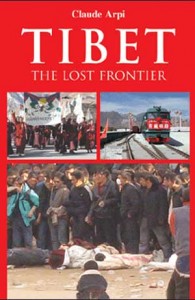Percival Landon, a British journalist explained the prevalent opinion in Lhasa:
“Briefly stated, his [Dorjiev’s] arguments were these: you have no strength in the country to resist the invaders, your natural protector and suzerain China, is a broken reed; even at this moment she is entirely under the domination of the British. If you remain any longer trusting to her support, you will find that she throws you as a sop to the Indian Government. The English are a rapacious nation and heretical nation; they will not respect your religion… On the other hand, if you will ask aid of Russia, you will secure the most powerful protector of the world.”19
| Also read: |
Nevertheless some Tibetan ministers thought that France was a good bet as they had been the first to offer their support. Some others thought of the British as an ally.
In Lhasa, it was finally decided to send Dorjiev back to Russia with a high-ranking delegation. In March 1901, one month after his return to the Tibetan capital, he left again for Russia with a delegation.
Tibet being a country situated between Central Asia and Western Siberia, Russia and China are mutually obliged to care for the maintenance of peace in that country.
Though Dorjiev was received with honour, the Russian Government was not so comfortable with his visit. The visit of Dorjiev’s delegation nevertheless got a lot of coverage in the local as well as the British press. While the British papers saw the visit as a danger to the interest of the Crown, Russian journalists were more interested by the exotic side of the delegation.
A note of the Marquis of Landsdowne to Sir G. Scott dated 18 February 1903, explains the reluctance of the Russian Government to get entangled in Tibetan affairs. The British Foreign Minister notes:
“During my conversation with the Russian Ambassador today I have referred to the question of Tibet, which we had discussed on the 11th instant. The interest of India in Tibet was I said of a very special character. With the map of Central Asia before me, I pointed out to His Excellency that Lhasa was within a comparatively short distance of the northern frontier of India. It was, on the other hand, considerably over 1,000 miles distant from the Asiatic possessions of Russia.”
The Tsar’s Government could probably understand this argument.
Commercial Agreement between Russia and China
In the meantime the rumours of an agreement between Russia and China on Tibet continued to circulate. Tension was mounting when Claude White, the Political Officer in Sikkim, proceeded towards the Tibetan border.
In case of a third powers contriving directly or indirectly, troubles in Tibet, Russia and China oblige themselves to concur in taking such measures as may seem advisable”¦
As a result of the forward policy of the British, an agreement was signed between the Russians and the Chinese in 1902.
This treaty, known as the “Commercial Agreement between Russia and China” has not been acknowledged by many historians, but it certainly was one of the direct justifications for the events of 1903-04. The main articles run as follows:
“Article 1: Tibet being a country situated between Central Asia and Western Siberia, Russia and China are mutually obliged to care for the maintenance of peace in that country. In case trouble should arise in Tibet, China, in order to preserve this district and Russia in order to protect her frontiers, shall despatch thither military forces on mutual notification.
Article 2: In case of a third power’s contriving directly or indirectly, troubles in Tibet, Russia and China oblige themselves to concur in taking such measures as may seem advisable for repressing such troubles.”
 The British were directly targeted in the above Article, and while Article 3 dealt only with religious worship, Article 4 elaborated the future strategic vision for Tibet, which should be gradually made a country with an independent inner administration.20
The British were directly targeted in the above Article, and while Article 3 dealt only with religious worship, Article 4 elaborated the future strategic vision for Tibet, which should be gradually made a country with an independent inner administration.20
The Imperial Solution
Lord Curzon was in favour of a more radical solution. A military expedition was seen by the Viceroy and the Government of India as the best way to call the Russian bluff. If Russia failed to abide by the Agreement, her prestige would be destroyed in the eyes of the Tibetans and they would have no alternative but to request Britain’s help and friendship.
Some parts of a lengthy report of the Viceroy to the Secretary of State for India are quoted here. This dispatch dated January 8, 1903 detailed the future British policy for Tibet. First, doubting the usefulness of negotiations, Lord Curzon wrote:
London was also of the opinion that the Russians should be requested to make a public statement of their foreign policy regarding Tibet and China
“…What we are concerned to examine is not the mere settlement of border dispute or even the amelioration of our future trading relations with Tibet but the question of our entire future political relations with that country, and with the degree to which we can permit the influence of another great Power to be exercised for the first time in Tibetan affairs.”21
Curzon made it clear that the ‘addiction’ of Lhasa to its policy of isolation was only temporarily ‘tolerated’ by British India. Curzon was not against having a tripartite conference, but it had to be on British terms: it should be held in Lhasa and the Tibetan Government should participate as an equal.22
The most famous statement of the Viceroy follows:
“In our view, the attempt to come to terms with Tibet through the agency of China has invariably proved a failure in the past, because of the intervention of this third party between Tibet and ourselves. We regard the so-called suzerainty of China over Tibet as a constitutional fiction, a political affectation which has been maintained because of its convenience to both parties.”
The only solution was then to open a dialogue, but how could a dialogue be started with the recalcitrant Tibetans?
To conclude, he suggested to London that a ‘trade’ mission be sent to Tibet under military escort to negotiate a trade agreement.
The iron was hot, it was time to strike. The dispatch became the cornerstone of British policy towards Tibet.
For Curzon it had become evident that the only way to establish ‘amicable relations and communication’ was to use force, if necessary. It was the continuation of the Forward Policy of Hastings.
The report ended with a cautionary note, the British Government should not “regret that action was not taken while it was still relatively free from difficulty”. The iron was hot, it was time to strike. The above dispatch became the cornerstone of British policy towards Tibet.




